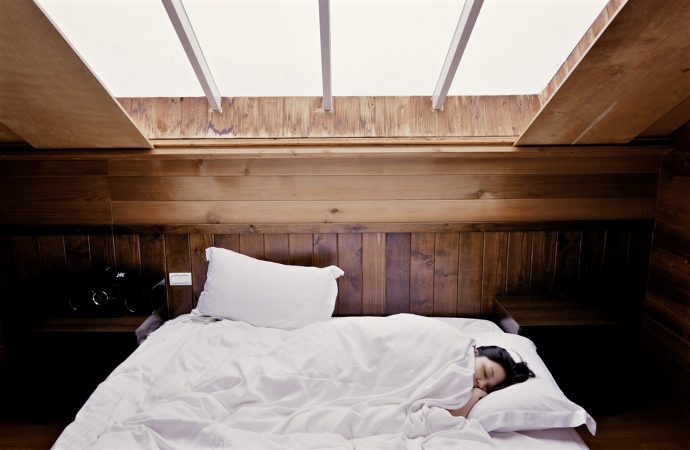The link between quality of sleep and marital satisfaction is bi-directional.
A study published in Sleep Medicine Reviews in 2007 [1]revealed that the quality of people’s relationships would affect the quality of their sleep and vice versa. According to the study, the sense of security and safety in a relationship could lead to a decrease in negative emotions and an increase in positive feelings, eventually leading to a better sleep quality.
However, the proponents of the same study also found that marital distress can be a cause and, at the same time, result of psychological distress and conditions like depression and anxiety. Inevitably, the troubles become risk factors for a disturbance in sleep. And sleep deprivation could, later on, lead to further damaging marriage interaction.
That is why, in another study [2], clinical psychologist Brant Hasler underscored the significance of taking into account the dynamics between sleep quality and a couple’s physical and psychological health. Data shows there is a close link between sleep and the happiness a couple would experience in a relationship.
Sleep is a vulnerable physiological state that optimally occurs when one feels sufficiently safe and secure to down-regulate vigilance and alertness.
Can sleeping in separate beds save your relationship?
A good night’s sleep will make you feel rejuvenated, fit, sharp, and happy like there isn’t a day’s challenge you can’t overcome. However, many couples find it almost impossible to sleep well with their partner snoring loudly or hogging the duvet, or when their child is taking up too much bed space.
There are plenty more reasons why a good sleep seems like a luxury these days, although many still choose to endure just because a majority of society considers sleeping separately as a taboo subject.
That is why a revolution is starting to take place in bedrooms. Some couples are back to sleeping in separate single beds, and it has nothing to do with a troubled marriage life, decreased sex drive, or a general feeling of unhappiness.
On the contrary, these couples find it more beneficial to spend the night apart. Some of them even reported having a higher quality of sleep as well as a more enjoyable sex life compared to when they shared the same bed.
Here are some reasons why sleeping separately might be a good idea for you.
One of you is a big time snorer
Snoring might not seem like a big deal, but it is no joke when you are trying to sleep with snores filling your head instead of a lullaby. Not only snoring is known to be casually linked to daytime dysfunction and heart diseases [3], it will also easily destroy another person’s peace of mind.
Don’t wait for your partner to arrive at a sleep-deprived mania, else both of you might become resentful of each other when morning comes. Don’t let snoring break you up. Try sleeping in a different room once in awhile, and lying in bed will be paradise for both of you.
Someone loves to hog the covers
Sometimes, being cold for nights at a time can be exasperating. Even when you’re sleeping beside the love of your life, you could still be spending cold nights miserably when someone is hogging all the covers.
Both of you want to sleep well and live well
Sharing a bed with someone means your sleep will likely be disturbed 50% more than it would be if you went on a solo slumber. Lacking sleep will increase your irritability, make you lose focus on the day’s activities, and reduce your overall well-being.
That’s why, aside from sleeping in separate beds for a few nights, you also need to choose mattresses you find comfortable and bedding that is breathable.
Your child wants to sleep on your bed
It isn’t uncommon for couples with kids to let their youngsters sleep beside them. However, more often than not, toddlers take up space that’s bigger than any couple would prefer.
Two-year-olds are natural acrobats and ninjas who can easily massage your face with their feet. And when that happens, sometimes the only solution is for one of you to hit a different bed. Ultimately, more space means a better sleep for everyone.
Takeaway
Even when most members of society think sleeping in different rooms is detrimental to any couple’s relationship, in reality it can be helpful and could even improve the bond between people.
Whether we’d like to admit it or not, sometimes what we need is a break now and then from what’s keeping us from having a good rest. A relaxing sleep shouldn’t be a luxury for any of us, and if sleeping on separate beds will help us get just that, then there’s nothing wrong if we give it a try once in awhile.
References:
[1]Troxel WM, Robles TF, Hall M, & Buysse DJ (2007). Marital quality and the marital bed: examining the covariation between relationship quality and sleep. Sleep medicine reviews, 11 (5), 389-404 PMID: 17854738
[2] Hasler BP, & Troxel WM (2010). Couples’ nighttime sleep efficiency and concordance: evidence for bidirectional associations with daytime relationship functioning. Psychosomatic medicine, 72 (8), 794-801 PMID: 20668283
[3] Sleep Foundation – Snoring and Sleep
[4] Richter, K., Adam, S., Geiss, L., Peter, L., & Niklewski, G. (2016). Two in a bed: The influence of couple sleeping and chronotypes on relationship and sleep. An overview. Chronobiology International, 33(10), 1464-1472.
Sources:
American Academy of Sleep Medicine – More Marital Happiness=Less Sleep Complaints
The New York Times: Marriage Linked with Better Sleep
[su_divider top=”no” divider_color=”#da7b3b” margin=”25″]
Author Bio
 Maggie Martin is Ph.D. in Cell Biology graduate. She is very passionate about healthy living and has been writing about Food and Healthy Lifestyles. When she is not busy, she takes interest in a variety of things such as lifestyle, food, health, herbal medicine, and the benefits of turmeric. Follow her on Twitter @Maggiemartink
Maggie Martin is Ph.D. in Cell Biology graduate. She is very passionate about healthy living and has been writing about Food and Healthy Lifestyles. When she is not busy, she takes interest in a variety of things such as lifestyle, food, health, herbal medicine, and the benefits of turmeric. Follow her on Twitter @Maggiemartink





